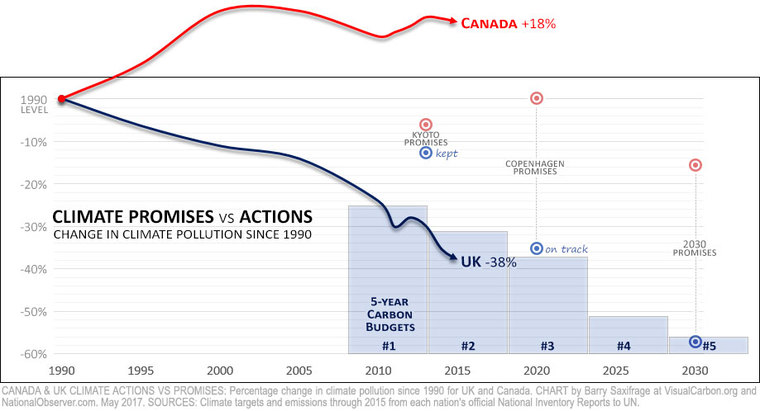Since the Liberals signed the Kyoto Accord in 1997, although they have continued to put forward a climate change agenda, they have failed over more than 20 years utterly to meet their own climate change targets or even come close. This was true under the Chretien and Martin Liberals and remains true today with the Trudeau Liberal government and their greenhouse emission reduction targets and the Paris Agreement.
Canada was active in the negotiations that led to the Kyoto Protocol in 1997, and the Liberal government that signed the accord in 1997 also ratified it in parliament in 2002.[2] Canada's Kyoto target was a 6% total reduction by 2012 compared to 1990 levels of 461 Megatonnes (Mt) (Government of Canada (GC) 1994). However, in spite of some efforts, federal indecision led to increases in greenhouse gas emissions (GHG) since then.[citation needed] Between the base year (1990) and 2008 Canada's GHG increased by around 24.1%.
For those who argue that this the Conservatives fault, the data below shows that the Liberals clearly failed to have their actions match their words on reducing greenhouse gas emissions from 1997 through the terms of the Chretien and Martin governments.
Canada is "one of the highest per-capita emitters in the OECD and has higher energy intensity, adjusted for purchasing power parity, than any IEA country, largely the result of its size, climate (i.e. energy demands), and resource-based economy. Conversely, the Canadian power sector is one of OECD's lowest emitting generation portfolios, producing over three-quarters of its electricity from renewable energy sources and nuclear energy combined." Canada GHG emissions increased from 1997 through 2001, dipped in 2002, increased again, then decreased in 2005. During the periods the Liberals were in power from 1997 to 2005 (they were defeated in January 2006 so it is not fair to look at the brief time they were in office that year) emissions increased on an almost continuous basis. Emissions actually declined somewhat for a couple of years under the Conservatives, but that was primarily due to the recession reducing economic activity rather than any climate action on their part.
- 1990 (461 Mt) (GC 1994)
- 1997 (671 Mt megatonne)
- 1998 (677 Mt)
- 2000 (716 Mt)
- 2001 (709 Mt)
- 2002 (715 Mt)
- 2003 (738 Mt)
- 2004 (742 Mt)
- 2005 (747 Mt) 33% higher than the Kyoto target
- 2006 (719 Mt)
- 2007 (748 Mt)
- 2008 (732 Mt)
- 2009 (690 Mt)
https://en.wikipedia.org/wiki/Canada_and_the_Kyoto_Protocol

